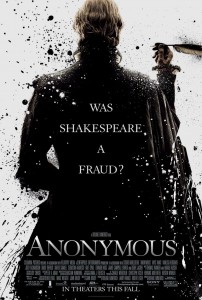 The authorship question regarding Shakespeare’s plays has always elicited debate. How could a man with simply a grammar school’s education go on to be one of the most celebrated authors of all time? Using a lecture by Derek Jacobi as a framing device, Roland Emmerich’s Anonymous begins to tell the phantasmal tale of the Earl of Oxford, Edward de Vere and how Shakespeare came to acquire the title of his plays. Amidst the politically tumultuous environment of Elizabethan England, the film follows the trials and tribulations that led this brilliant but misunderstood author to become anonymous.
The authorship question regarding Shakespeare’s plays has always elicited debate. How could a man with simply a grammar school’s education go on to be one of the most celebrated authors of all time? Using a lecture by Derek Jacobi as a framing device, Roland Emmerich’s Anonymous begins to tell the phantasmal tale of the Earl of Oxford, Edward de Vere and how Shakespeare came to acquire the title of his plays. Amidst the politically tumultuous environment of Elizabethan England, the film follows the trials and tribulations that led this brilliant but misunderstood author to become anonymous.
Drawing on Emmerich’s previous work (2012, Independence Day), the characteristic tone of the film is immensely melodramatic, a mood that marks every issue and situation. Every scene was the epitome of intensity. For some moments of the film this works, like when de Vere goes to live in the Puritanical household of the Cecils. The issue arises when the film attempts to be so heavily dramatic that it loses moments of real suspense because there is no respite from the tension.
Along those lines, the film suffers from a non-linear timeline that creates constant and rapid changes in time period. Scene cuts shift time periods and character names more often than not, leaving the audience confused for a large part of the film. It detracts from the plot, as the audience constantly tries to figure out the chronology and characters of each scene.
That said, some of the characters provide the greatest strengths of the film. Rhys Ifans’ depiction of Edward de Vere is simply remarkable. He carries the film at many moments, depicting an empathetic central character that serves as an anchor for the audience. Similarly, Vanessa Redgrave fantastically portrays the virgin queen and her decline into illness and madness.
The depiction of several other characters, however, serves to further the premise of the film with questionable results. William Shakespeare (Rafe Spall) becomes a buffoon who is not only unable to write, but also willing to commit murder. Shakespeare’s character in Anonymous seems more similar to the fool of his plays than the eloquent Shakespeare elevated by dramatists for centuries. Still, the depiction provides desperately needed comic relief and, incense aside, is enjoyable.
The artistic elements of the film, every set, every costume, every design, were absolutely fantastic, creating a vivid and imaginative world of Elizabethan England. Every scene was beautiful; no technical elements had any visible flaws, and the overall piece was extremely pleasing to the eye.
However, the attempts to make this film historically relevant become more and more outlandish as the film progresses. So many of the premises that the film tries to create and develop are simply ridiculous. Historically, Shakespeare’s plays follow a stylistic progression over time, a fact reflected in the evolution of his texts and subject matter. Yet the film postulates that all the plays were simply staged in that order by de Vere’s decision. In another scene, Shakespeare murders Christopher Marlowe because after he discovers the true author when, in reality, Marlowe died in a duel. The divergences from already established facts become more and more base, to the point that anyone versed in Shakespearian knowledge could not accept the film’s argument.
Overall, Anonymous attempts to both question Shakespeare’s authorship and create an entertaining film for audiences, and fails at both. It disregards and twists historical facts, races through time and space from scene to scene, and leaves audiences both disappointed and baffled by the increasing ridiculousness of the story. Exciting and visually stunning, Anonymous fails to convince anyone, and loses audiences along the way.